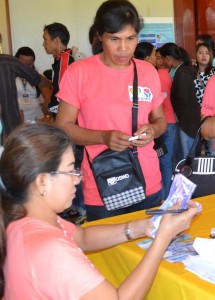 The Conditional Cash Transfer (CCT) Program, locally known as the Pantawid Pamilyang Pilipino Program (4Ps), contributes to the local economy and benefits all members of the communities involved.
The Conditional Cash Transfer (CCT) Program, locally known as the Pantawid Pamilyang Pilipino Program (4Ps), contributes to the local economy and benefits all members of the communities involved.
Jean Lee Patindol, economics professor at the University of St. La Salle in Bacolod City, in an “Economic Terms and Trends” lecture at the Philippine Information Agency-sponsored Developmental and Technical Writing Seminar held at the Iloilo Grand Hotel last April 20, pointed this out.
Patindol said the cash grants that the Pantawid Pamilya or 4Ps beneficiaries are receiving every payout are usually mostly used for purchasing commodities within the communities where the beneficiaries reside. “This has a domino and multiplier effect. Local businesses which earn income from the beneficiaries’ purchases are then encouraged to invest more in their businesses, even as they also purchase from other sectors. This creates business and investments growth which can, in turn, lead to employment growth. In the end, both 4Ps and non-4Ps members of communities,” she explained.
From a macroeconomic perspective, Patindol stressed that the Pantawid Pamilyang Pilipino Program is not a dole out because it has integrated social components. “I know that the program has certain conditions. Apart from attending the Family Development Sessions (FDS), beneficiaries are also obliged to comply with periodic check- ups and school attendance so it is not a simple dole out of cash,” she added.
Patindol said that the program is very beneficial to the poorest of the poor households and this needs to be institutionalized for long-term sustainability.
The Pantawid Pamilyang Pilipino Program is a human development measure of the national government under the Department of Social Welfare and Development (DSWD) that provides conditional cash grants to the poorest of the poor, to improve the health, nutrition, and the education of children aged 0-18. Presently, Region 6 has 319, 528 household beneficiaries. Of the number, Aklan has 27,268; Antique, 28,533; Capiz, 38,349; Guimaras, 8,176; Iloilo, 92,175; and Negros Occ., 125,027.//dswd6//Montesa G. Caoyonan
